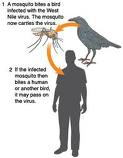BURLINGTON, ON August 4, 2012 The West Nile virus has always been out there – it had just not been seen with human beings until last week when the Regional Health department was notified by Public Health Ontario of the first probable human cases of West Nike; one a female in her fifties in Burlington and a female in her thirties from Milton.
 “These first human cases of West Nile virus illness underscore the need to protect yourself from being bitten by mosquitoes,” said Dr. Monir Taha, Associate Medical Officer of Health for Halton Region. “This message is particularly important for older adults because they are at higher risk for more serious West Nile virus illness.”
“These first human cases of West Nile virus illness underscore the need to protect yourself from being bitten by mosquitoes,” said Dr. Monir Taha, Associate Medical Officer of Health for Halton Region. “This message is particularly important for older adults because they are at higher risk for more serious West Nile virus illness.”
In Halton, the months of highest risk for human WNV illness are August and September, however with the abnormally high temperatures the high risk period has started earlier.
Mosquitoes can transmit WNV to humans after becoming infected by feeding on the blood of birds carrying the virus. About 80% of people who become infected with WNV do not experience any illness, while about 20% will develop West Nile fever.
Less than 1% will develop inflammation of the brain or its lining, or a type of paralysis. Older adults and people with underlying illnesses should be particularly cautious as they are more likely to develop the illness. The following are steps that residents can take to protect themselves and their families from mosquitoes:
Cover up. Wear light-coloured, long-sleeved shirts and pants with tightly-woven fabric.
Avoid being outdoors from early evening to morning when mosquitoes are most active and likely to bite, as well as at any time in shady, wooded areas.
Reduce mosquito breeding sites around your home by getting rid of all water-filled containers and objects. Change the water in bird baths at least once per week.
Use an approved insect repellent, such as one containing DEET.
Click to see map showing the locations of standing water sites that have had larvicide applied.


















